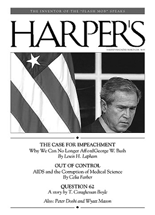Researchers worldwide castigate magazine for giving credence to view virus unrelated to AIDS
“AIDS denialism directly kills a lot of people,” said Nathan Geffen, policy coordinator at the Treatment Action Campaign in South Africa. “It’s disgraceful and it needs to be stopped.”
Geffen was among roughly 40 AIDS activists, researchers, and clinicians who sent an open letter to the monthly magazine denouncing the article that ran in its March issue. They have demanded a retraction, an apology, and that their documentation of the errors in the piece be published on the Harper’s Web site and in the magazine.
“So far it’s well over 50 and counting,” Geffen said, about his count of the article’s flaws. “We’re not talking about trivial errors.”
The story was written by Celia Farber, a journalist who has authored many pieces that have drawn on the views of researchers and activists who believe that HIV is not the cause of AIDS. Her work has appeared in Spin, USA Today, Gear, and other leading mainstream publications. She did not respond to a phone message seeking comment or an e-mail sent to her on behalf of Gay City News from a Harper’s editor.
Farber is on the board of the Group for the Scientific Reappraisal of the HIV-AIDS Hypothesis, a group that includes AIDS denialists among its members, though her views are less clear. In a 2000 interview with Poz magazine she said, “Does HIV cause AIDS? I’ve never said that it does or it does not. I’m not really equipped to know. But when I look around and see legions of respectable scientists arguing that it does not, then I cannot see why I shouldn’t report it. It’s not only news, it’s great human drama.”
In part, the piece investigated two clinical trials, one in the U.S. and the second in Uganda, that weighed the efficacy and safety of nevirapine, an anti-HIV drug, in preventing mother-to-child transmission of HIV. Both studies gave the drug to pregnant women.
The U.S. trial recruited 38 women, but it was shut down after several women experienced serious side effects and one woman died. The Uganda trial, which was funded by the National Institutes of Health (NIH), a U.S. health agency, was criticized for sloppy record-keeping and mismanagement, but its conclusion that the drug is safe and effective has been endorsed by U.S. agencies that investigated the trial.
The story also described the mistreatment of an NIH employee after he blew the whistle on the Uganda trial.
Farber wrote that while the two trials should raise questions about the safety of nevirapine and the conduct of drug trials, the “so-called community AIDS activists were sprung like cuckoo birds from grandfather clocks at the appointed hour to affirm the unwavering AIDS catechism: AIDS drugs save lives. To suggest otherwise is to endanger millions of African babies.”
The piece also cited Dr. Peter Duesberg, a professor of molecular and cell biology at the University of California at Berkeley, and Dr. Kary B. Mullis, a chemist who shared the 1993 Nobel Prize in chemistry for inventing the polymerase chain reaction. Both men have long denied that HIV is the cause of AIDS and, the piece asserted, Duesberg has effectively been blackballed in the scientific community.
Roger D. Hodge, the Harper’s deputy editor and editor of the Farber story, told Gay City News that the story was not about whether HIV is the cause of AIDS, but concerned the mismanagement of drug studies and the censoring of debate.
“It’s not as if this is happening in isolation,” he said. “There has been scandal after scandal after scandal… It’s not as if human experimentation doesn’t have it problems… Celia has covered the story for a long time. Part of the story is that a certain kind of name-calling, a certain kind of moral blackmail, takes the place of scientific debate. People like Peter Duesberg have been persecuted for trying to have a scientific debate.” Hodge said the story was carefully vetted.
“It was very, very thoroughly fact-checked over the course of three months,” he said. “A lot of what people are describing as errors are differences of opinion about the data.”
Asked whether he believed that the HIV virus was the cause of AIDS, Hodge, who will become the magazine’s editor within a month, said, “I don’t feel like I am qualified to judge it. Am I a partisan? My general position is I am very skeptical about absolutist arguments, so I want to hear the entire argument. More argument is better.”
The open letter called the article “pseudo-science” and “dangerous because of its potential to convince people in desperate need of antiretroviral medicines not to take them, with life-threatening consequences.”
Farber “is sympathetic to, and has herself long perpetuated, the factually incorrect views that HIV is not the cause of AIDS and that the risks of antiretrovirals outweigh their benefits,” the letter read.
The view that HIV causes AIDS is supported by what most people would see as overwhelming evidence and that is the consensus among scientists and researchers. While AIDS drugs can have unpleasant side effects, they have maintained the lives and health of hundreds of thousands, if not millions, of people with HIV.
AIDS denialism can have serious consequences, Geffen said.
“The only reason that AIDS denialism is so rampant in South Africa is because it has the support of the president and the health minister,” he said, referring to Thabo Mbeki and his controversial top health adviser, Dr. Manto Tshabalala-Msimang.”
Geffen said that some denialists were actively recruiting South Africans to participate in studies meant to prove the effectiveness of vitamins against HIV.
“What they are doing is they are convincing people, very sick people with AIDS, not to take AIDS drugs and take vitamins instead,” he said. “It’s unbelievable that they are getting away with this. We are going to court to try and stop them.”
Julie Davids, executive director of the Community HIV/AIDS Mobilization Project (CHAMP), said that denialists had not had a significant impact in the US.
“I think so much of what happens with HIV, whether it’s prevention or care, there are so many factors that can weigh in on whether someone can access care, I don’t think the Harper’s article is going to have an impact,” she said.
CHAMP was among the signatories on the open letter. For Davids, the article was about a misplaced desire to challenge accepted wisdom and be entertaining.
“I understand that Harper’s wants to be outrageous and feel like they are doing things that others won’t,” she said. “I just have to ask why they would print an article that they know includes dramatic misinformation…There is an admiral role for challenging suspect consensus that’s not what this story is. It’s full of holes.”
gaycitynews.com


































